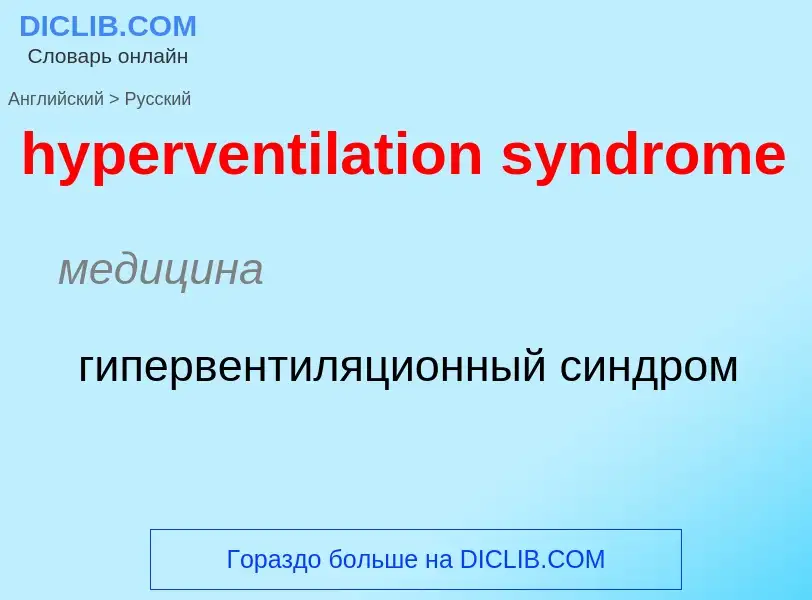Перевод и анализ слов искусственным интеллектом ChatGPT
На этой странице Вы можете получить подробный анализ слова или словосочетания, произведенный с помощью лучшей на сегодняшний день технологии искусственного интеллекта:
- как употребляется слово
- частота употребления
- используется оно чаще в устной или письменной речи
- варианты перевода слова
- примеры употребления (несколько фраз с переводом)
- этимология
hyperventilation syndrome - перевод на русский
медицина
гипервентиляционный синдром
медицина
гипофизарный евнухоидизм
адипозогенитальная дистрофия
гипофизарное ожирение
медицина
церебро-окуло-фациоскелетный синдром
Определение
Википедия
Hyperventilation syndrome (HVS), also known as chronic hyperventilation syndrome (CHVS), dysfunctional breathing hyperventilation syndrome, cryptotetany, spasmophilia, latent tetany, and central neuronal hyper excitability syndrome (NHS), is a respiratory disorder, psychologically or physiologically based, involving breathing too deeply or too rapidly (hyperventilation). HVS may present with chest pain and a tingling sensation in the fingertips and around the mouth (paresthesia) and may accompany a panic attack.
People with HVS may feel that they cannot get enough air. In reality, they have about the same oxygenation in the arterial blood (normal values are about 98% for hemoglobin saturation) and too little carbon dioxide (hypocapnia) in their blood and other tissues. While oxygen is abundant in the bloodstream, HVS reduces effective delivery of that oxygen to vital organs due to low-CO2-induced vasoconstriction and the suppressed Bohr effect.
The hyperventilation is self-promulgating as rapid breathing causes carbon dioxide levels to fall below healthy levels, and respiratory alkalosis (high blood pH) develops. This makes the symptoms worse, which causes the person to breathe even faster, which then, further exacerbates the problem.
The respiratory alkalosis leads to changes in the way the nervous system fires and leads to the paresthesia, dizziness, and perceptual changes that often accompany this condition. Other mechanisms may also be at work, and some people are physiologically more susceptible to this phenomenon than others.
The mechanism for hyperventilation causing Paresthesia, lightheadedness, and fainting is: hyperventilation causes increased blood pH (see Respiratory alkalosis for this mechanism), which causes a decrease in free ionized calcium (Hypocalcaemia), which causes paresthesia and symptoms related to hypocalcaemia.



